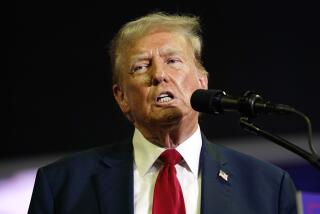Rehnquist Rules 2 White House Lawyers Must Testify
- Share via
WASHINGTON — For the second time in less than a month, Chief Justice William H. Rehnquist on Tuesday rejected a White House request to delay grand jury testimony by witnesses in the Monica S. Lewinsky investigation.
Without providing an explanation, Rehnquist refused to stay an appellate court ruling that upheld independent counsel Kenneth W. Starr’s subpoena of White House lawyers Bruce Lindsey and Lanny A. Breuer.
Within minutes of Rehnquist’s decision, Breuer--the less senior of the two attorneys--appeared at the U.S. Courthouse, where he spent most of the day before one of two grand juries that Starr is using to try to wrap up his nearly seven-month-long inquiry.
The appellate court had ruled that the attorney-client privilege does not shield lawyers on the public payroll from answering all questions in a criminal investigation by another federal official. Prosecutors want to question the officials about their knowledge of Clinton’s relationship with the former White House intern and anything the president may have done to try to cover it up.
But in the latest indication that the legal wrangling in the case is far from over, White House lawyers and Starr’s prosecutors were seen late Tuesday entering the courtroom of Chief U.S. District Judge Norma Holloway Johnson for an hourlong closed-door hearing.
The subject of the hearing was not disclosed but Johnson serves as the arbiter when grand jury witnesses object on legal grounds to answering specific questions.
Since January, Breuer, 40, has helped coordinate responses to Starr’s subpoenas and debriefed grand jury witnesses willing to cooperate with the White House. As part of a joint defense agreement with private lawyers for the president and others, Breuer would have a wealth of information about closed-door meetings on the Lewinsky case.
White House officials said that they believed Breuer would tell grand jurors that he had no knowledge of criminal wrongdoing by Clinton, the same general position Lindsey has taken.
The White House said Monday that it would ask the Supreme Court to review the ruling on attorney-client privilege. In the meantime, however, officials are concerned that White House Counsel Charles F. C. Ruff and Deputy Counsel Cheryl D. Mills, who have worked extensively on the Lewinsky case, also are possible targets for subpoenas from the grand jury.
Spokesman Barry Toiv said that White House officials hope the high court will consider what he called the “critical issue” of attorney-client privilege. The case concerns much more than “whether one person is required to testify,” he said.
But because the Supreme Court is in recess until Oct. 5, it is unlikely that any action by the high court would affect Starr’s investigation. Some congressional leaders expect Starr to report to Congress on the results of his inquiry by late September, although the independent counsel has refused to give a timetable.
Under the Constitution, only members of the House can vote to indict a president and send his case to the Senate for trial under impeachment proceedings.
Rehnquist’s decision echoed a similar ruling on July 17, when he turned down an appeal by the administration to put off testimony by past and present Secret Service employees about the president’s conduct.
The chief justice rejected arguments that Secret Service agents should be excused from testifying about a president they are responsible for protecting. At least five more Secret Service witnesses answered grand jury questions Tuesday.
The timing of Lindsey’s return to testify is more likely to be determined by his health than by legal issues; he had back surgery last week.
Meanwhile, a new public opinion survey offered some comfort to anxious supporters of the president.
The poll of 1,189 adults, conducted last weekend by the Pew Research Center for the People and the Press, showed that the president’s job approval rating remains a high 63%--higher than at any other time before January, when Starr’s investigation introduced Lewinsky’s name to the public.
The poll also found, however, that 70% of Americans now believe that allegations the president had sex with Lewinsky are definitely or probably true--up from 54% in February--and that Clinton will continue to deny any sexual relationship when he testifies to the grand jury on Aug. 17.
Yet support for impeachment of the president appears to have declined. Asked if they would support Clinton’s removal from office “if there were conclusive proof” that he had a sexual relationship with Lewinsky and lied under oath about it, 36% said that he should be impeached--down from 45% in March--while 58% said that he should not be impeached--up from 48% in March.
Americans also appear weary of the whole matter. Asked to consider the hypothetical question: What if Clinton were to tell the American people that he had an affair with Lewinsky but lied about it under oath to protect his family, 60% said that should be enough to end Starr’s investigation.
In other matters, Judge Johnson has been designated by the U.S. Court of Appeals to investigate complaints of leaks from Starr’s office. David E. Kendall, the president’s private lawyer, made the complaints.
The court, in a still-confidential ruling, said that Johnson must conduct the inquiry herself or by means of a special master--but she cannot proceed with her plan to have sworn statements taken from Starr’s staff members by Kendall or other presidential lawyers.
Starr had protested that such a plan could enable the White House to gain improper access to details of his investigation, and appellate judges agreed.
Times staff writers Ronald J. Ostrow and Erin Trodden contributed to this story.
More to Read
Sign up for Essential California
The most important California stories and recommendations in your inbox every morning.
You may occasionally receive promotional content from the Los Angeles Times.













